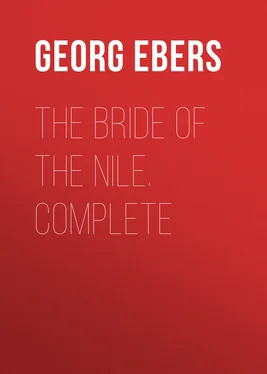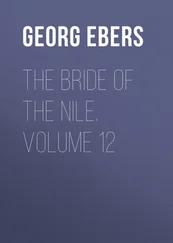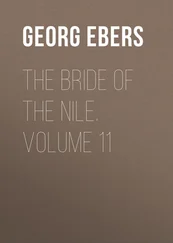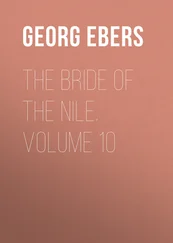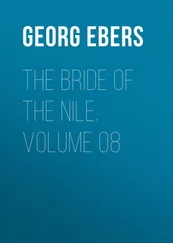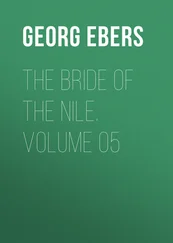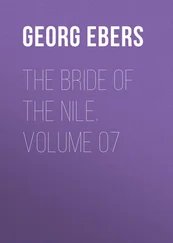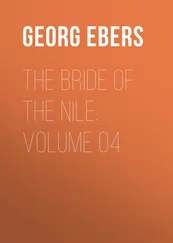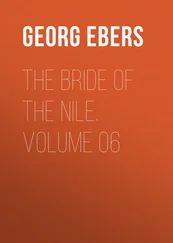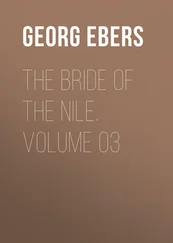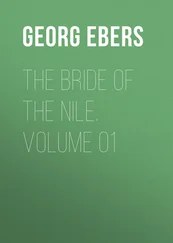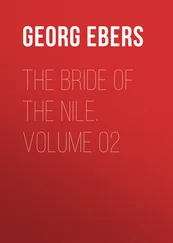Georg Ebers - The Bride of the Nile. Complete
Здесь есть возможность читать онлайн «Georg Ebers - The Bride of the Nile. Complete» — ознакомительный отрывок электронной книги совершенно бесплатно, а после прочтения отрывка купить полную версию. В некоторых случаях можно слушать аудио, скачать через торрент в формате fb2 и присутствует краткое содержание. Жанр: foreign_prose, literature_19, foreign_antique, на английском языке. Описание произведения, (предисловие) а так же отзывы посетителей доступны на портале библиотеки ЛибКат.
- Название:The Bride of the Nile. Complete
- Автор:
- Жанр:
- Год:неизвестен
- ISBN:нет данных
- Рейтинг книги:4 / 5. Голосов: 1
-
Избранное:Добавить в избранное
- Отзывы:
-
Ваша оценка:
- 80
- 1
- 2
- 3
- 4
- 5
The Bride of the Nile. Complete: краткое содержание, описание и аннотация
Предлагаем к чтению аннотацию, описание, краткое содержание или предисловие (зависит от того, что написал сам автор книги «The Bride of the Nile. Complete»). Если вы не нашли необходимую информацию о книге — напишите в комментариях, мы постараемся отыскать её.
The Bride of the Nile. Complete — читать онлайн ознакомительный отрывок
Ниже представлен текст книги, разбитый по страницам. Система сохранения места последней прочитанной страницы, позволяет с удобством читать онлайн бесплатно книгу «The Bride of the Nile. Complete», без необходимости каждый раз заново искать на чём Вы остановились. Поставьте закладку, и сможете в любой момент перейти на страницу, на которой закончили чтение.
Интервал:
Закладка:
“I remember it perfectly.”
“Well, you have long been just like him. ‘All things move,’ says Heraclitus, so you are forced to float onwards with the great stream; or, to vary the image, you must walk forwards on the high-road of life towards the common goal; but your eye is fixed on what lies behind you, feasting on the prospect of a handsome and wealthy home, kindness and tenderness, noble and loving faces, and a happy, but alas! long-lost existence. All the same, on you must go.—What must the result be?”
“I must stumble, you think, and fall?”
The physician’s reproof had hit Paula all the harder because she could not conceal from herself that there was much truth in it. She had come hither on purpose to find encouragement, and these accusations troubled even her sense of high health. Why should she submit to be taken to task like a school-girl by this man, himself still young? If this went on she would let him hear.... But he was speaking again, and his reply calmed her, and strengthened her conviction that he was a true and well-meaning friend.
“Not that perhaps,” he said, “because—well, because nature has blessed you with perfect balance, and you go forward in full self-possession as becomes the daughter of a hero. We must not forget that it is of your soul that I am speaking; and that maintains its innate dignity of feeling among so much that is petty and mean.”
“Then why need I fear to look back when it gives me so much comfort?” she eagerly enquired, as she gazed in his face with fresh spirit.
“Because it may easily lead you to tread on other people’s feet! That hurts them; then they are annoyed, and they get accustomed to think grudgingly of you—you who are more lovable than they are.”
“But quite unjustly; for I am not conscious of ever having intentionally grieved or hurt any one in my whole life.”
“I know that; but you have done so unintentionally a thousand times.”
“Then it would be better I should quit them altogether.”
“No, and a thousand times no! The man who avoids his kind and lives in solitude fancies he is doing some great thing and raising himself above the level of the existence he despises. But look a little closer: it is self-interest and egoism which drive him into the cave and the cloister. In any case he neglects his highest duty towards humanity—or let us say merely towards the society he belongs to—in order to win what he believes to be his own salvation. Society is a great body, and every individual should regard himself as a member of it, bound to serve and succor it, and even, when necessary, to make sacrifices for it. The greatest are not too great. But those who crave isolation,—you yourself—nay, hear me out, for I may never again risk the danger of incurring your wrath—desire to be a body apart. What Paula has known and possessed, she keeps locked in the treasure-house of her memory under bolt and key; What Paula is, she feels she still must be—and for whom? Again, for that same Paula. She has suffered great sorrow and on that her soul lives; but this is evil nourishment, unwholesome and bad for her.”
She was about to rise; but he bent forward, with a zealous conviction that he must not allow himself to be interrupted, and lightly touched her arm as though to prevent her quitting her seat, while he went on unhesitatingly:
“You feed on your old sorrows! Well and good. Many a time have I seen that trial can elevate the soul. It can teach a brave heart to feel the woes of others more deeply; it can rouse a desire to assuage the griefs of others with beautiful self-devotion. Those who have known pain and affliction enjoy ease and pleasure with double satisfaction; sufferers learn to be grateful for even the smaller joys of life. But you?—I have long striven for courage to tell you so—you derive no benefit from suffering because you lock it up in your breast—as if a man were to enclose some precious seed in a silver trinket to carry about with him. It should be sown in the earth, to sprout and bear fruit! However, I do not blame you; I only wish to advise you as a true and devoted friend. Learn to feel yourself a member of the body to which your destiny has bound you for the present, whether you like it or not. Try to contribute to it all that your capacities allow you achieve. You will find that you can do something for it; the casket will open, and to your surprise and delight you will perceive that the seed dropped into the soil will germinate, that flowers will open and fruit will form of which you may make bread, or extract from it a balm for yourself or for others! Then you will leave the dead to bury the dead, as the Bible has it, and dedicate to the living those great powers and gracious gifts which an illustrious father and a noble mother—nay, and a long succession of distinguished ancestors, have bequeathed to a descendant worthy of them. Then you will recover that which you have lost: the joy in existence which we ought both to feel and to diffuse, because it brings with it an obligation which it which is only granted to us once to fulfil. Kind fate has fitted you above a hundred thousand others for being loved; and if you do not forget the gratitude you owe for that, hearts will be turned to you, though now they shun the tree which has beset itself intentionally with thorns, and which lets its branches droop like the weeping-willows by the Nile. Thus you will lead a new and beautiful life, receiving and giving joy. The isolated and charmless existence you drag through here, to the satisfaction of none and least of all to your own, you can transform to one of fruition and satisfaction—breathing and moving healthily and beneficently in the light of day. It lies in your power. When you came up here to give your care to these poor injured creatures, you took the first step in the new path I desire to show you, to true happiness. I did not expect you, and I am thankful that you have come; for I know that as you entered that door you may have started on the road to renewed happiness, if you have the will to walk in it.—Thank God! That is said and over!”
The leech rose and wiped his forehead, looking uneasily at Paula who had remained seated; her breath came fast, and she was more confused and undecided than he had ever seen her. She clasped her hand over her brow, and gazed, speechless, into her lap as though she wished to smother some pain.
The young physician beat his arms together, like a laborer in the winter when his hands are frozen, and exclaimed with distressful emotion: “Yes, I have spoken, and I cannot regret having done so; but what I foresaw has come to pass: The greatest happiness that ever sweetened my daily life is gone out of it! To love Plato is a noble rule, but greater than Plato is the truth; and yet, those who preach it must be prepared to find that truth scares away friends from the unpleasing vicinity of its ill-starred Apostles!”
At this Paula rose, and following the impulse of her generous heart, offered the leech her hand in all sincerity; he grasped it in both his, pressing it so tightly that it almost hurt her, and his eyes glistened with moisture as he exclaimed: “That is as I hoped; that is splendid, that is noble! Let me but be your brother, high-souled maiden!—Now, come. That poor, crazy, lovely girl will heal of her death-wound under your hands if under any!”
“I will come!” she replied heartily; and there was something healthy and cheerful in her manner as they entered the sick-room; but her expression suddenly changed, and she asked pensively:
“And supposing we restore the unhappy girl—what good will she get by it?”
“She will breathe and see the sunshine,” replied the leech; “she will be grateful to you, and finally she will contribute what she can to the whole body. She will be alive in short, she will live. For life—feel it, understand it as I do—life is the best thing we have.” Paula gazed with astonishment in the man’s unlovely but enthusiastic face. How radiantly joyful!
Читать дальшеИнтервал:
Закладка:
Похожие книги на «The Bride of the Nile. Complete»
Представляем Вашему вниманию похожие книги на «The Bride of the Nile. Complete» списком для выбора. Мы отобрали схожую по названию и смыслу литературу в надежде предоставить читателям больше вариантов отыскать новые, интересные, ещё непрочитанные произведения.
Обсуждение, отзывы о книге «The Bride of the Nile. Complete» и просто собственные мнения читателей. Оставьте ваши комментарии, напишите, что Вы думаете о произведении, его смысле или главных героях. Укажите что конкретно понравилось, а что нет, и почему Вы так считаете.
